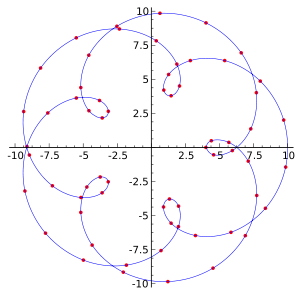This article includes a list of general references, but it lacks sufficient corresponding inline citations. (October 2016) |
In the mathematical field of numerical analysis, interpolation is a type of estimation, a method of constructing (finding) new data points based on the range of a discrete set of known data points.[1][2]
In engineering and science, one often has a number of data points, obtained by sampling or experimentation, which represent the values of a function for a limited number of values of the independent variable. It is often required to interpolate; that is, estimate the value of that function for an intermediate value of the independent variable.
A closely related problem is the approximation of a complicated function by a simple function. Suppose the formula for some given function is known, but too complicated to evaluate efficiently. A few data points from the original function can be interpolated to produce a simpler function which is still fairly close to the original. The resulting gain in simplicity may outweigh the loss from interpolation error and give better performance in calculation process.

- ^ Sheppard, William Fleetwood (1911). . In Chisholm, Hugh (ed.). Encyclopædia Britannica. Vol. 14 (11th ed.). Cambridge University Press. pp. 706–710.
- ^ Steffensen, J. F. (2006). Interpolation (Second ed.). Mineola, N.Y. ISBN 978-0-486-15483-1. OCLC 867770894.
{{cite book}}: CS1 maint: location missing publisher (link)